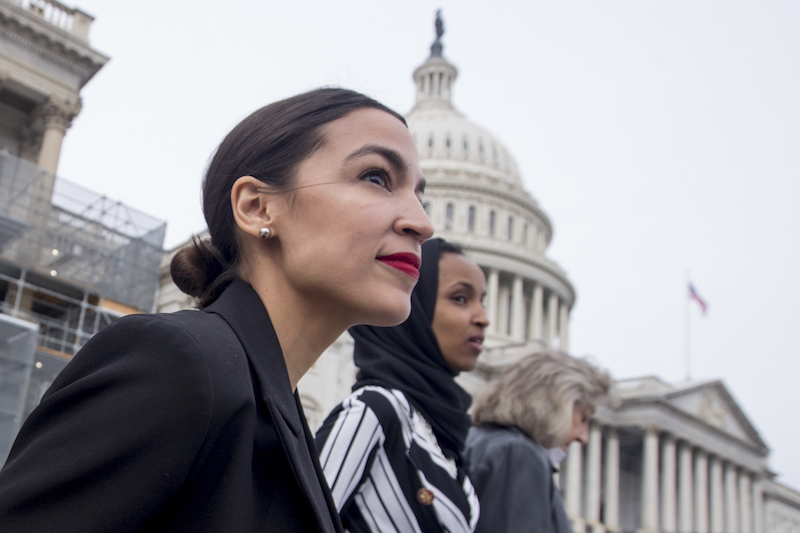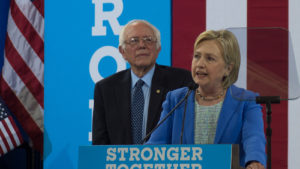Alexandria Ocasio-Cortez Proposes Perfectly American Tax on Ultra-Rich
For much of the 20th century, top earners had been taxed at even higher rates than what the lawmaker has proposed. Reps. Alexandria Ocasio-Cortez, left, of New York and Ilhan Omar of Minnesota walk down the House steps as the 116th Congress begins. (Andrew Harnik / AP)
Reps. Alexandria Ocasio-Cortez, left, of New York and Ilhan Omar of Minnesota walk down the House steps as the 116th Congress begins. (Andrew Harnik / AP)
In an effort to fund policies that would reduce fossil fuel and carbon emissions within the next 12 years, Democratic Rep. Alexandria Ocasio-Cortez of New York has proposed a tax rate on the super-rich that is more moderate than U.S. tax policy during parts of the 20th century. In a video clip released Friday, she tells journalist Anderson Cooper of “60 Minutes” that taxing incomes above $10 million at a 60 percent to 70 percent rate could be a good step.
“There’s an element where, yeah, people are going to have to start paying their fair share in taxes,” she said, echoing Vermont Sen. Bernie Sanders to remind skeptics that historically, income rates in the U.S. have been much higher.
The tax would be marginal, meaning it would not apply to a top earner’s entire income. “That doesn’t mean all $10 million are taxed at an extremely high rate,” Ocasio-Cortez said, “but it means that as you climb up this ladder you should be contributing more.”
The approximately 16,000 Americans earning more than $10 million are at the very top of the top 1 percent of earners. Such a tax could bring in approximately $720 billion over 10 years, according to the Tax Policy Center’s Mark Mazur.
From 1918 to 1921, during World War I, and then again from 1936 to 1980, the highest marginal income tax rates were at or above 70 percent, according to the Tax Policy Center. Rates have reached as high as 94 percent.
“Her tax policy is more generous to the rich than Jimmy Carter’s was, and the 1 percent wasn’t nearly as well-off in the 1970s as it is now,” Eric Levitz wrote in New York Magazine.
Some economists, including Emmanuel Saez and Thomas Piketty, have also argued in favor of a higher tax rate on the super-rich.
“Until the 1970s, policy-makers and public opinion probably considered—rightly or wrongly—that at the very top of the income ladder, pay increases reflected mostly greed rather than productive work effort,” Saez and Piketty wrote in 2013, arguing that a top tax rate could be set as high as 83 percent. Since the 1970s, they wrote, countries that made large tax cuts for top earners did not grow faster than countries that continued large taxes for the very rich.
When Sanders proposed a 90 percent tax on the rich in 2015, Josh Bivens, of the Economic Policy Institute, said: “It’s not that radical, unless you’re calling Eisenhower’s America a radical place, and given that no one would propose a high rate like that on anything like an ordinary income, it would basically be irrelevant to the tax burden of the vast majority of Americans.”
“You can get a hell of a lot of money from taxing the 1 percent,” Edward Wolff, a tax expert at New York University, told The Washington Post.
Your support matters…Independent journalism is under threat and overshadowed by heavily funded mainstream media.
You can help level the playing field. Become a member.
Your tax-deductible contribution keeps us digging beneath the headlines to give you thought-provoking, investigative reporting and analysis that unearths what's really happening- without compromise.
Give today to support our courageous, independent journalists.






You need to be a supporter to comment.
There are currently no responses to this article.
Be the first to respond.